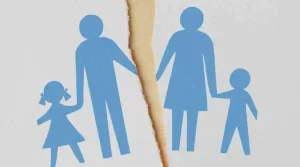You have decided to get a divorce in Kentucky in 2022. What comes next? First of all, you should know that men who are going through a divorce in Kentucky are more likely to make mistakes that will cost them money and time. Are you ready to get your divorce in 2022 off to the best possible start? Here are some of the most common mistakes men make during a divorce and how to avoid them.
Blunder #1: Not making sure your father's rights are safe from a pandemic
With all the unknowns about Omicron and where the pandemic will go, it’s clear that divorced or separated parents still need to take public health emergencies into account when making plans for child custody.
For a divorce in Kentucky in 2022, it’s a good idea (and just common sense) for the parents to include an “emergency plan” in their custody agreement. This way, if emergency measures need to be taken again, the parents will know how to change their parenting time. Think back to the height of the pandemic, when kids were learning from home, some parents worked from home, and others were first responders or other important workers. Most of us were stuck in one place because we couldn’t go anywhere.
What kind of plans should you have in place to protect your access to your children in case of a public health emergency, now or in the future? For example, in a case our firm won last year, a doctor at a busy hospital in Kentucky had his ex refuse to let him see his kids because she was afraid the doctor would make the kids sick. The father M.D. was able to show the courts how far he went to keep himself safe from the virus. The courts agreed with the doctor’s dad and said that keeping the kids away from their father was the biggest danger they faced right now.
In your emergency parenting plan, think about ways to protect the time you spend with your kids, such as making up time when you can’t be there.
You can also ask: Who will watch your kids if they need to learn from afar? Who will take care of your kid if you or your partner gets sick? What if your child needs to stay in quarantine after close contact? What should you do if your child gets sick? Having a plan in place is important for co-parenting because it makes it easier to switch gears in a calm way if something goes wrong.
What covid-19 vaccine choices divorced parents must make
The Covid-19 vaccine can be given to children who are at least 5 years old. Do you want your kids to get vaxxed? To have a say in whether or not your kids get vaccinated, you must first have joint legal custody or sole legal custody. Where your kids live depends on where you have physical custody of them. Legal custody means having the right to make decisions about a child’s health care, education, religious upbringing, and other things. If one parent has sole legal custody, they can make these decisions on their own. If both parents have joint or shared legal custody, they can both weigh in.
Figure out what kind of legal custody you want to go for. Find out more about the Covid vaccines and your rights as a parent.
Blunder #2: Leaving your ex in charge after moving out.
After deciding to get a divorce, it may seem like a no-brainer to move out of the family home. But unless you are in a very dangerous situation, you might want to stay where you are. This is why:
- You let someone else run the house and take care of your kids. By leaving the house, you are basically giving your spouse free reign over it. Your spouse might decide to change the locks without telling you. Since you’re no longer there, they can do this.
Your spouse will also decide when you can see your kids, so moving out could make it harder for you to see them, especially if you only make a casual, non-verbal deal.
- In the end, you pay for two homes. When you move out, you are also agreeing to pay for two households. This is because you chose to move out and take on the cost of a new home while still having to pay (at least in part) for your old one.
- Your divorce could take longer than you expect. You thought this arrangement would only last a few months or maybe a year until the divorce was final, right? Well, in these Covid times, everything, including divorce, could take longer in the court system. If you need court hearings for your divorce, you might have to wait over a year for just one, and you’ll have to pay for this arrangement the whole time.
Even if your spouse asks or even demands that you leave, that doesn’t mean you have to, unless there are special circumstances (i.e., a restraining order).
If you do move out, you should insist on a written, strong, and detailed plan for custody and parenting time so that neither of you has the upper hand when it comes to the kids.
Blunder #3: Social Media Rants
If your divorce is getting worse and worse and every little thing is turning into a fight, it may feel good at the moment to rant on Facebook or YouTube. In the long run, however, posting things that are mean-spirited doesn’t make things less tense.
The problem for a lot of angry spouses is that it’s hard to stop ranting online. When you talk about your problems with all of your Facebook friends instead of, say, going to a therapist, you create an audience that wants to hear more drama. What’s the point of avoiding conflict when your Facebook friends and YouTube fans give you lots of comments and likes when you air your dirty laundry?
When your ex finds out what you’ve been posting, even if the only proof is a screenshot sent by a mutual friend, an angry rant could get you in trouble, like cyber harassment or stalking charges.
On dating sites, don’t lie!
Want to get back out there and meet new people? Be careful about what you write in your profile on a dating site. If you post photos of yourself “living large,” even if you’re not, your ex may use them as proof that you’re hiding assets or should pay more alimony. One man even lost his custody case because his ex used his dating profile, which said he had “zero kids,” as proof that he didn’t care about his role as a parent, and the judge agreed.
Blunder #4: Letting your spouse file for you.
You chose to end your marriage. But that’s not where important divorce decisions end. In fact, that’s where they start. The next big decision you’ll have to make is whether or not to file the legal paperwork to start the divorce process in Kentucky. This isn’t just any paperwork, because the date you file is when assets or debts from a marriage stop growing.
Before the date you file for divorce, any property or debts you got while you were married are considered to belong to both of you, and the divorce will divide them.
After the date of filing for divorce, most property or debts are considered separate and won’t be included in the divorce.
You shouldn’t leave the date you file for divorce up to chance or to your spouse. Do what’s best for your situation by taking the following steps to figure out when to file:
Look at all your money accounts. Do you have money coming to you soon from a retirement plan, work bonus, deferred compensation plan, or stock options payout? If so, it might be best to start the divorce process as soon as it’s clear that it’s going to happen. Even saving a few months’ worths of 401K contributions from dividing assets can add up to a bigger retirement fund that doesn’t have to be split.
If you wait to file, do any “length of the marriage” dates come into play? In Kentucky, if you’ve been married for 20 years or more, your ex could ask for “open durational alimony.” This is a type of alimony that is only available to people who have been married longer. Here’s how this can be a mistake: A man knew his marriage was over, but he didn’t file for divorce until the day after what would have been their 20th wedding anniversary. What’s that? His ex-wife immediately asked for alimony for a longer time with no set end date. If he had filed for divorce before their 19th wedding anniversary, he would have only had to pay alimony for a shorter amount of time.
Look at your debts. Is there proof that your partner has been buying a lot on credit, or has the divorce fight gotten so bad that you could see your partner spending a lot as a way to get back at you?
Blunder #5: Beware! Tax rules for alimony have changed.
Since a new tax law went into effect in 2019, spouses who alimony payments must report it as taxable income on their federal tax returns. Spouses who receive alimony do not have to report it as income, so they don’t have to pay taxes on it.
The tax change is a complete reversal of the old federal law, which said that spouses who paid alimony could deduct it from their income as a tax break, while spouses who got it had to report it as taxable income. Be wary of old information that still says that alimony is a great way to save money on taxes. Old alimony orders from before 2019 are grandfathered in under the old rules, but if you get a new alimony order in 2022, you’ll have to claim payments without getting a tax break.
Men who pay alimony often make the mistake of not running their projected taxes after the divorce to see how the alimony will change their tax bracket and how much they will owe. Knowledge is power, and depending on how much this affects your bottom line, you may want to negotiate a lump sum payment to get the tax burden over within a year or negotiate other assets to reduce alimony payments.
In the long run, being smart now will save you money, time, and stress.
Have questions about your divorce? Start protecting yourself right away by making an appointment with one of our experienced family law attorneys to talk about a plan. Get answers to all of your questions and a clear plan for what you should do next. We can be reached at (270) 558-4790, or you can click the button below.



